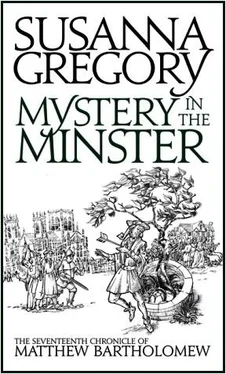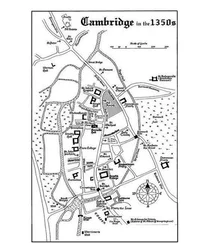‘He was,’ agreed a new voice, and it was all Bartholomew could do to prevent himself from reacting when he saw Isabella. ‘Unlike his selfish, treacherous executors.’
‘You should have stayed in the minster,’ said Helen, moving quickly to embrace her cousin. ‘There was no need for you to have come.’
‘I wanted to be here,’ Isabella assured her. ‘Besides, the minster is more like a fish-market than a house of prayer at the moment, and I could not concentrate on my devotions.’
‘Everything is in place,’ Helen assured her. ‘Anketil died before we could get him, but Dalfeld is expected at any moment. Then we shall seal the door, leaving him to die here in terror.’
‘At the same time ensuring that dear Cotyngham is buried with his beloved congregation for all eternity,’ finished Isabella, smiling. ‘But why are Cynric and Michael here? We have no grudge against them. Indeed, our uncle would want them returned safely to Cambridge.’
‘Yes, but unfortunately they stumbled across our plan, so they must die, too,’ explained Helen. ‘Our revenge is almost complete, and I am unwilling to forgo it, even for them.’
Isabella inclined her head. ‘However, we cannot wait for Dalfeld. He is notoriously unpunctual, and I would sooner send him poison. The scholars shall have the crypt to themselves.’
‘Thank God!’ breathed Frost. ‘Someone who sees sense at last.’
‘Is Zouche’s last will and testament the reason you have done all this?’ asked Michael, to prevent them from leaving. Frost had taken Helen’s arm and was guiding her towards the steps, while the soldiers now toted mallets. ‘Because its terms were not fulfilled?’
Bartholomew was in an agony of indecision. Should he attack now? Or wait, and hope he would be able to rescue Michael and Cynric after the scaffolding had been knocked down? But one glance at the now-sagging ceiling told him it would collapse long before he could reach them. Meanwhile, Michael’s question had caught Isabella’s attention. Like all people with a cause, she was eager to explain why she was right.
‘Our uncle wanted to be buried in a chantry chapel, and asked nine men to see it finished,’ she said bitterly. ‘With the exception of Marmaduke, they all failed him.’
‘He gave them money, property and promotions when he was alive,’ added Helen, pulling away from Frost, much to his agitated exasperation. ‘He loved them and trusted them. But they took what he gave, then declined to carry out their end of the bargain. They were not dishonest – they stole nothing – but they allowed the fund to evaporate through laziness and incompetence.’
‘So you killed them,’ said Michael in disgust. ‘Starting with Christopher five years ago, and followed by Neville, Welton, Playce, Stiendby, Ferriby and Roger. Fournays is easy to hoodwink – he gave verdicts of spotted liver and debility. But what happened to Roger? Did he hurl himself into the King’s Fishpool in his final agonies, allowing Fournays to say he drowned?’
‘There was no agony – he simply fell. We are not monsters.’ Isabella sounded indignant that he might think so. ‘Alice dabbles in the dark arts, and I read about this particular compound in one of her books – a substance that kills quickly, but with no pain. None of them suffered, I assure you.’
‘Alice knows nothing of our work, before you ask,’ added Helen. ‘She would not approve.’
‘So that vicar with the big teeth – Ferriby – was right when he claimed he had been poisoned,’ said Michael, gabbling now. ‘It was not just because he was old and addled.’
‘He became suspicious after Christopher and Neville,’ explained Isabella with a grimace. ‘We wanted to dispatch him sooner, but he was too careful. Of course, the foolish man never asked why there were designs on his miserable life. If he had, he might have finished the chantry chapel, and thus been spared.’
‘But Dalfeld is not an executor,’ said Michael. ‘Why should he–’
‘He was our uncle’s lawyer,’ replied Isabella, all righteous indignation. ‘He had a moral responsibility to see his wishes fulfilled. But he did not bother.’
‘Zouche would not have wanted this!’ cried Michael, as they all turned to go. He sounded frantic, and Cynric shot an agonised glance in Bartholomew’s direction, urging him to act. ‘He–’
‘Do you not comprehend the enormity of the crime against him?’ flared Isabella, with such passion that Michael flinched. ‘His inept executors have interfered with the progress of his immortal soul! He might be trapped in Purgatory for ever without his obits, and–’
‘I do not believe that,’ shouted Michael. ‘Not if he was a good man. Let me go, Isabella. We can discuss this theological point, because Aquinas says–’
‘Do not listen to him,’ warned Frost, when Isabella’s interest was caught. ‘Debate with Jorden or Mardisley instead. They are excellent theologians – better than this monk.’
‘They are,’ acknowledged Isabella sullenly. ‘But they refuse to include me in their discourses. I shall poison them soon, too, because they have no right to reject me.’
‘They reject you because you are not as good as you think,’ declared Cynric, sufficiently confident that he was about to be saved to lash out with some brutal truths. ‘You talk a lot, but your grasp of the subject is feeble. And any decent scholar knows it.’
Isabella’s jaw dropped, and Bartholomew winced. Cynric was right: Isabella’s knowledge was flawed, but saying so now was hardly sensible. Rage took the place of shock, and she advanced on the book-bearer with a murderous expression. Desperately, Bartholomew tried to think of a way to distract her without squandering the slim advantage of surprise that he held. But Michael was there before him.
‘Myton!’ he yelled, and Bartholomew knew exactly what he was going to say; he had drawn the same conclusion himself, based on what Chozaico had whispered just before he had left. ‘ He stole the chantry money.’
Isabella’s advance on Cynric faltered. Meanwhile, Helen had allowed Frost to guide her up the first few steps, but at Michael’s claim, she spun around. This time, however, Frost nodded that his men were to begin demolishing the scaffolding. They walked towards it, mallets at the ready.
‘Gisbyrn’s ruthless competition was destroying Myton’s business,’ Michael raced on. ‘And he needed cash to save it. So he started to borrow from a source that was not being used.’
‘The chantry fund,’ breathed Isabella, exchanging a shocked glance with her cousin.
‘No one stole it,’ said Marmaduke firmly. ‘It just dribbled away. We would have noticed theft.’
‘No,’ said Michael harshly, ‘you would not. No one was monitoring it very assiduously, and Myton was probably careful to remove only small amounts. But small amounts add up over time.’
‘Hurry,’ snapped Frost to his men.
‘Wait!’ countered Helen. She turned to Michael, while the soldiers exchanged nervous glances, torn between two masters. ‘Go on.’
‘I imagine Myton intended to pay it back. But he borrowed more and more, and his finances never improved. When he realised he never would be able to replace what he had taken, he killed himself. His raiding of his friend’s chantry money is the “terrible sin” he mentioned in the letter he wrote to Gisbyrn, and what he almost confessed to Chozaico.’
‘So your vengeance is misplaced,’ finished Cynric, full of disdain. ‘Myton is the real villain.’
Frost had had enough. He strode towards the scaffolding and snatched a mallet from one of the soldiers. All his agitation and anxiety was in the first blow he dealt the structure, and splinters flew in every direction. The sound boomed through the vault, and Bartholomew was sure the ceiling sagged. The soldiers evidently thought so, too, because they ran, knocking over one of the lamps as they went. In the sudden darkness that descended in his corner, Bartholomew scrambled to his feet.
Читать дальше












